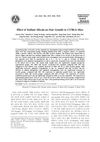 4 citations,
January 2010 in “Laboratory Animal Research”
4 citations,
January 2010 in “Laboratory Animal Research” Sodium silicate helped mouse hair grow similarly to a known hair growth treatment.
 2 citations,
January 2013 in “Elsevier eBooks”
2 citations,
January 2013 in “Elsevier eBooks” The document explains the genetic causes and characteristics of inherited hair disorders.
 2 citations,
June 2011 in “Expert Review of Dermatology”
2 citations,
June 2011 in “Expert Review of Dermatology” Female pattern hair loss involves thinning hair on crown and frontal scalp, diagnosed by hair ratio, and treated with minoxidil, antiandrogens, or hair transplantation.
 2 citations,
March 2001 in “Environmental Health Perspectives”
2 citations,
March 2001 in “Environmental Health Perspectives” Small hormonal imbalances can cause significant health problems, so more sensitive testing for hormone-disrupting chemicals is needed.
 1 citations,
December 2018 in “IntechOpen eBooks”
1 citations,
December 2018 in “IntechOpen eBooks” Human hair shows promise for non-invasive medical testing, but more research is needed to standardize its use.
 February 2023 in “Sibirskij onkologičeskij žurnal”
February 2023 in “Sibirskij onkologičeskij žurnal” Chemotherapy often causes hair loss in cancer patients, affecting their mental health, but scalp cooling can help prevent it.

The document concludes that diagnosing female hair loss requires careful examination, with treatments varying by condition and psychological support often necessary.
 January 2018 in “Springer eBooks”
January 2018 in “Springer eBooks” Gender affects hair and scalp characteristics, with differences in hormone responses, graying patterns, and trace metals.
 November 2013 in “Elsevier eBooks”
November 2013 in “Elsevier eBooks” Skin and hair renewal is maintained by both fast and slow cycling stem cells, with hair regrowth primarily driven by specific stem cells in the hair follicle bulge. These cells can also help heal wounds and potentially treat hair loss.
 March 2014 in “Medicina cutánea ibero-latino-americana”
March 2014 in “Medicina cutánea ibero-latino-americana” Melatonin applied to the scalp helps increase hair density in people with early hair loss.

Melatonin applied to the scalp helps treat early-stage hair loss in men and women.
 January 2022 in “Journal of Healthcare Sciences”
January 2022 in “Journal of Healthcare Sciences” Male Androgenetic Alopecia, a common hair loss in men, can be slowed and partially restored with treatments like minoxidil and finasteride, or hair transplantation. Serenoa repens may be an alternative treatment. More research is needed for new treatments.

Topical minoxidil helps treat hair loss in teens, but more research needed for safe options.
June 2024 in “Journal of Drug Delivery Science and Technology” Nanocarrier-based treatments show promise for better hair growth in androgenetic alopecia but need more research.
 May 2024 in “FEBS open bio”
May 2024 in “FEBS open bio” Annurca apple extract may help treat hair loss and protect against oxidative stress.
 2 citations,
July 2023 in “International Journal of Molecular Sciences”
2 citations,
July 2023 in “International Journal of Molecular Sciences” BFNB could be a promising treatment for hair growth.
January 2022 in “Aesthetic surgery journal” Extracellular vesicles may effectively treat hair loss with minimal side effects.
 26 citations,
January 2007 in “Organogenesis”
26 citations,
January 2007 in “Organogenesis” Bioengineering can potentially treat hair loss by regenerating hair follicles and cloning hair, but the process is complex and needs more research.
 5 citations,
February 2022 in “Acta Biomaterialia”
5 citations,
February 2022 in “Acta Biomaterialia” Nanomaterials can improve hair care products and treatments, including hair loss and alopecia, by enhancing stability and safety, and allowing controlled release of compounds, but their safety in cosmetics needs more understanding.
 4 citations,
September 2016 in “PubMed”
4 citations,
September 2016 in “PubMed” Using platelet-rich fibrin matrix with hair transplant techniques helps in hair regrowth in male baldness patients.
2 citations,
July 2021 in “Genes” A specific genetic change in the KRT71 gene causes a hair loss condition in Hereford cattle.

Thyroid problems can cause hair loss and change hair texture.
 September 2021 in “Medicina estética”
September 2021 in “Medicina estética” Sabal serrulata and biomimetic peptides with microneedling reduced hair loss and improved hair thickness in men with balding.
 47 citations,
January 2013 in “International Journal of Cosmetic Science”
47 citations,
January 2013 in “International Journal of Cosmetic Science” Hair diversity is influenced by complex genetics and environmental factors, requiring more research for practical solutions.
 44 citations,
January 2005 in “Dermatology”
44 citations,
January 2005 in “Dermatology” Hair problems can be caused by genetics or the environment, and treatment should focus on the cause and reducing hair damage.
 73 citations,
January 2013 in “European journal of dermatology/EJD. European journal of dermatology”
73 citations,
January 2013 in “European journal of dermatology/EJD. European journal of dermatology” Antioxidants may help fight oxidative stress linked to autoimmune skin diseases.
 54 citations,
September 2012 in “Dermatologic Clinics”
54 citations,
September 2012 in “Dermatologic Clinics” Some medications can cause hair loss, but stopping the drug usually leads to recovery within 3 months.
 23 citations,
October 2015 in “Andrology”
23 citations,
October 2015 in “Andrology” New male hormonal contraceptives show promise but need more research on long-term effects and funding for larger trials.
 14 citations,
August 2022 in “Lupus Science & Medicine”
14 citations,
August 2022 in “Lupus Science & Medicine” SLE patients experience two patterns of non-inflammatory symptoms: intermittent and persistent.
 9 citations,
March 2021 in “Hormones”
9 citations,
March 2021 in “Hormones” COVID-19 may affect male fertility and women might have better outcomes due to hormonal and immune differences.



























